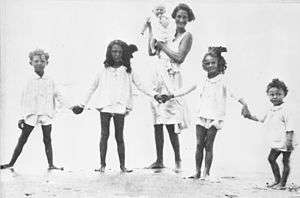Virginia Bourbon del Monte
Donna Virginia Bourbon del Monte dei principi di San Faustino (Rome, 24 May 1899 – Pisa, 30 November 1945) was the wife of Edoardo Agnelli and the mother of Gianni Agnelli.
| Virginia Bourbon del Monte | |
|---|---|
 | |
| Born | Virginia Bourbon del Monte dei principi di San Faustino[1] 24 May 1899 Rome, Italy |
| Died | 30 November 1945 (aged 46) Pisa |
| Spouse | Edoardo Agnelli |
| Issue | Princess Clara von Fürstenberg (1920–2016) Gianni Agnelli (1921–2003) Susanna, Contessa Rattazzi (1922–2009) Maria Sole (1925) Cristiana, Contessa Brandolini d'Adda (1927) Giorgio Agnelli (1929–1965) Umberto Agnelli (1934–2004) |
| House | Bourbon del Monte |
| Father | Carlo Bourbon del Monte, Prince di San Faustino |
| Mother | Jane Allen Campbell |
| Religion | Roman Catholicism |
She was the daughter of Carlo Bourbon del Monte, Prince di San Faustino (1867–1917), a descendant of an ancient Tuscan-Umbrian family. Her mother was the American Jane Allen Campbell (1865–1938).
Biography
Virginia married Edoardo Agnelli, the son of Senator and Fiat co-founder Giovanni Agnelli, on 5 June 1919. She became a widow on 14 July 1935, as Edoardo died in a plane crash in the seadrome of Genoa.
A few months after the death of her husband, Virginia engaged in an intimate relationship with the journalist and writer Curzio Malaparte. Their wedding ceremony—originally scheduled for October 1936[2]—didn't take place due to the stubborn opposition of Virginia's father-in-law, Senator Giovanni Agnelli. Moreover, Curzio had become unpopular among the highest authorities of Benito Mussolini's regime. As a consequence, the disgraced reporter had been expelled from the National Fascist Party (PNF) and forced into exile on the island of Lipari for a certain period of time in 1933. Meanwhile, Virginia had to face a tough confrontation with her father-in-law, who tried to claim parental authority over her seven children by all means after finding out that the two lovers were about to get married.
In deliberating on this issue, the Court of Turin pronounced a verdict against the mother. The dispute went on with several legal actions, until Virginia decided to move to Rome. Since there were better chances for her of being favoured by the judicial authorities of Rome, her father-in-law finally gave his consent to negotiate a compromise agreement by the end of 1937. Its most important aspect was the granting of child custody to Virginia: this settlement was exactly the one supported by her children themselves.
Virginia was arrested in Rome on 8 September 1943, since she was the daughter of a U.S. citizen, a country at that time at war against Germany, and confined in a villa on the Caelian Hill, from which she was then able to escape.
After coming back to Rome as a free person, Virginia arranged —in collaboration with Colonel Eugen Dollmann— a meeting in Vatican City between Pope Pius XII and General Karl Wolff. The latter was the Military Governor and the Supreme Commander of the SS and of the police in Northern Italy. The meeting was intended to avoid bloodshed during the imminent German retreat from Rome. It was successful, and led to the release from prison of Giuliano Vassalli. The jurist and member of the Resistance had been held in detention by the SS in their headquarters in the German Embassy on 145 Via Tasso.
Virginia perished in a car accident near Pisa in the late afternoon of 30 November 1945, after the car in which she was traveling - on its way from Rome to Forte dei Marmi - was hit head-on by a heavy truck of the U.S. Army. The fatal crash occurred on the Via Aurelia in proximity to the pine forest of San Rossore. She died instantly.[3]
References
- http://www.thepeerage.com/p16327.htm#i163267
- M. Ripa di Meana e G. Mecucci, Virginia Agnelli, p. 143
- M. Ripa di Meana e G. Mecucci, Virginia Agnelli, p. 236
Further reading
- Marco Ferrante, Casa Agnelli, Mondadori, 2007, ISBN 978-88-04-56673-1
- Giancarlo Galli, Gli Agnelli, il tramonto di una dinastia, Mondadori, Edizione 2003, ISBN 88-04-51768-9
- Alan Friedman, Agnelli and the network of italian power, Mandarin Paperback (Octopus Publishing Gr.), London, 1988, ISBN 0-7493-0093-0
- Angiolo Silvio Ori, Storia di una dinastia - Gli Agnelli e la Fiat, Editori Riuniti, Roma, 1996 ISBN 88-359-4059-1
- Marina Ripa di Meana e Gabriella Mecucci, Virginia Agnelli, Argelato (BO), Minerva Edizioni, 2010, ISBN 978-88-7381-307-1
- Gigi Moncalvo, Agnelli segreti, Vallecchi, 2012, ISBN 978-88-8427-236-2